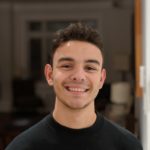Originally published in Footprints.
I built Heaven when I was four. My parents were fighting and I could not bear it, so I went in the cupboard in my room, closed the door, pressed my hands hard against my ears until they hurt, and I closed my eyes. It all came to me instinctively. At first, it was barely anything; a few apple trees, a strawberry field, two or three dogs and endless sunshine. I spent an hour in this place, climbing the trees, picking the strawberries, playing with the dogs. When I left, my parents had stopped fighting.
It felt right to name my place Heaven. The name gave it roots; Heaven was still there and unaltered the following week when my dad was drunk driving me home. I just shut my eyes and ears and the back seat of the car became the strawberry field surrounded by apple trees. When I got bored after a few minutes, I started building a house. I thought it would make Heaven feel more like home. I laid the bricks one at a time so each one of them would sink into my memory. When I was done and left Heaven, my dad had driven me home.
As years passed, Heaven grew and grew because life was falling apart. My grandpa died and I planted an enchanted forest. My parents got divorced and I built a zoo. My sister overdosed and I erected a city. I never told anyone about Heaven—I knew what it would sound like—but whenever I saw my mom crying, I wished for a way to share it just with her.
My eighteenth birthday marked the first time I felt ashamed of Heaven. Like every year, I spent the night on the tallest rooftop I had built and watched the fireworks. When I put an end to the fireworks and left, I did not think anymore about people forgetting my birthday. I had, however, an unpleasant feeling that was considerably worse, and the feeling became a thought. I was an adult and adults did not live in made-up worlds. It was even worse to discover, after that, that I did not feel like an adult. What was I then? None of the answers that came were positive. When you start seeing yourself from the outside, especially after having lived inside of your head for so long, you divide yourself in two. My thoughts became second person. Shrieks and screams filled my mind. I blamed everything on the ever growing, stupid, imaginary universe in my head. I wanted to burn down Heaven.

Photo by Meelan Bawjee on Unsplash
Heaven, of course, could not burn down. I tried to shut it out of my mind instead. It lasted five years; when I was sent to war, war sent me back to Heaven. In the midst of battle in a country I did not know, the sight of people dying and the deafening sound of bombings lead me to do what all soldiers do at one point. I pressed my hands hard against my ears until they hurt and closed my eyes. The strawberry field and apple trees appeared immediately. I cried and ran, through the enchanted forest and the city, past the zoo, across the suspension bridge through the mountains, until I reached the beach, where I jumped in the water and swam, swam, swam, until my mind hurt. When I left, I found that nothing had changed, I was still at war, the dead were still dead. That night, after we retreated, I went to Heaven while everyone was sleeping and built a cemetery for those who had died and would never be buried. There was room for everyone. After I was done, I walked all the way back to the strawberry field and left Heaven for the last time. I vowed never to come back.
Only now am I starting to miss Heaven. The job that kept my mind off my smaller problems is over. The lover that pulled me through my bigger ones is dead. I want to escape again. My memory, unfortunately, is too weak. No matter how many times I try shutting my eyes and ears, I never get more than blackness and silence. If I try imagining the strawberry field or the apple trees, they fade away after a few seconds. For the first time since I turned eighteen, I want to be a child again.
Then, on an uneventful night, I wake up from an uneventful dream to find that my body has stopped moving. My ears have stopped listening. My eyes have stopped seeing. It feels no different than falling asleep except everything turns white instead of black. There is, however, nothing after that, no dream to dream. I just stand there in endless white, waiting for something to happen. “What do I do?” I finally ask. The answer resonates in my head. Anything. I smile. “I’ll start with just one thing,” I say.
I kneel down and plant a strawberry.
 Aged eighteen, François Provencher is currently studying arts and design at Brébeuf College, in Montreal. Besides short stories, François has written a short film, which he also directed, and a full-length stage play. He has furthermore practiced stage acting for many years, although nothing can rival his love of literature.
Aged eighteen, François Provencher is currently studying arts and design at Brébeuf College, in Montreal. Besides short stories, François has written a short film, which he also directed, and a full-length stage play. He has furthermore practiced stage acting for many years, although nothing can rival his love of literature.